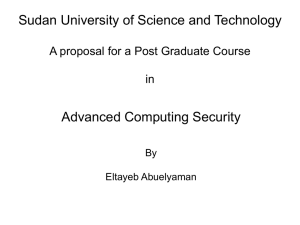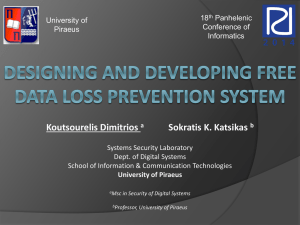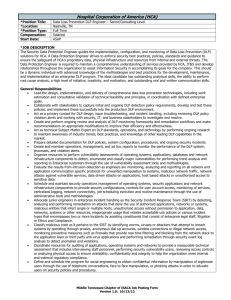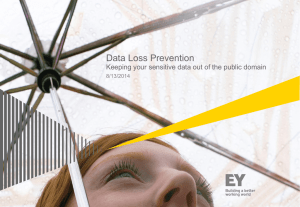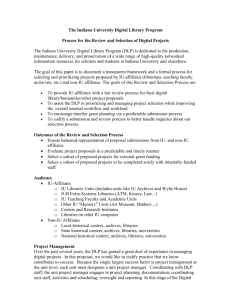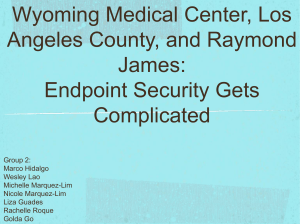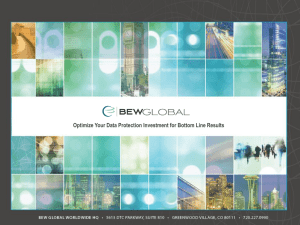Securing Confidential Data within a Business
advertisement
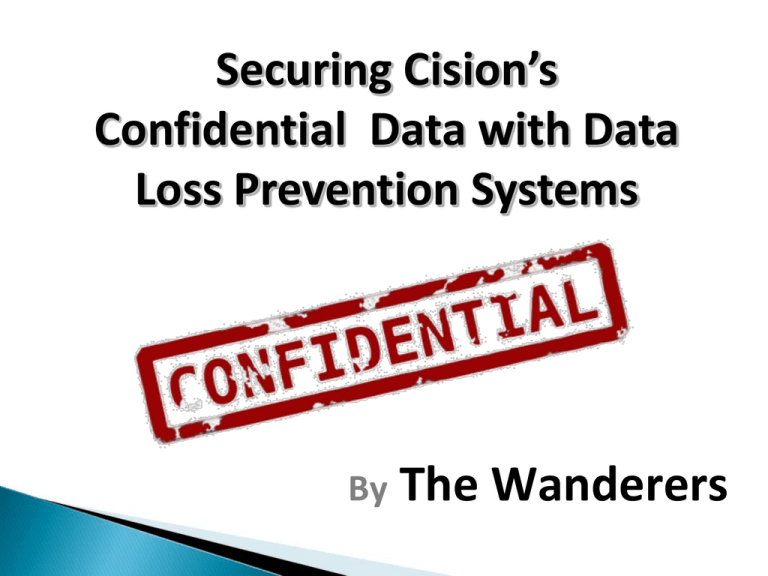
Securing Cision’s Confidential Data with Data Loss Prevention Systems By The Wanderers Outline of contents Business Problem and Requirements [Scott] Data Loss Prevention (DLP) Solutions [Angel] Proposed Solution [Koonal] Vendor Comparisons and Architecture [Wander] Company implementation & Conclusion [Scott] Business Problem Problem Cision needs the capability to exchange confidential information securely and easily. Cision 1200 Employees, 30+ offices, 8 countries Confidential Data Credit Card / Client Information Customer privileged data Employee personal data Business Confidential data Secure data from Employee Error, Employee Theft Business Solution Requirements Required Meet the Payment Card Industry (PCI) requirements for credit card handling Prevent client, business or employee data from being incorrectly disclosed internally and externally Global capabilities with central configuration and enforcement Out of Scope Anti Virus, Firewall, Intrusion Detection Systems, Email Spam Filtering Limited Other legal requirements: No HIPPA or SOX requirements Source: http://www-uxsup.csx.cam.ac.uk/~fanf2/hermes/doc/talks/2008-04-techlinks/data-protection.jpg DLP Background Definition of Data Loss Prevention Products that, based on central policies, identify, monitor, and protect data at rest, in motion, and in use, through deep content analysis. -Rich Mogull of Securosis Other TLAs Data Loss Protection Data Leak Prevention/Protection Information Loss Prevention/Protection Information Leak Prevention/Protection Extrusion Prevention System Content Monitoring and Filtering Content Monitoring and Protection DLP Background Identify where holes or exit points where leaks may occur Instant messaging (Yahoo Instant Messaging, Windows Live) P2P file sharing (e.g. LimeWire case as reported by LA Times) Media streaming Web mail (Yahoo mail, Gmail, Hotmail) USB storage devices (ZDNet story from UK) Removable drives Devices connected through external ports (Firewire, serial, parallel) FTP server Printouts DLP Background Source: Securosis.com http://securosis.com/images/uploads/Pragmatic_Data_Security-_Data_Protection_DecisiionsV2.006_.png DLP Background How data are flagged and identified Initial predefined policies Social security numbers Prescribed in HIPAA, SOX, GLBA, etc. (Bank account numbers, Credit card numbers) Customized categories based on client needs Data Discovery Looks into the content and not just the file type Examine context considerations (factor in parent directories, user group matching) Structured data matching (SSN, credit card numbers, etc) Unstructured data matching (diagrams, source codes, media files) Fingerprint the data by using one way hash and saved in the database Information can then be used to identify confidential data elsewhere DLP Background Three different levels of DLP solution Data in Motion Data at Rest Data which uses HTTP, FTP, IM, P2P and SMTP protocols are mirrored in the DLP server for inspection where visibility is enhanced Data in file servers, databases, hosts computers set for file sharing, etc. Data at End Points Data which sits on end user hosts (workstations and notebooks) DLP Background Technical Feature Considerations Deep content analysis, monitoring and prevention Centralized Management Central policy setting, dashboard features Broad content management across platforms and ease of Integration Identification and blocking capability Review of information infrastructure including software for requirement and compatibility issues Automated remediation Transfer confidential files, LDAP lookup, secure purging of sensitive data Business Environment Considerations Matching with Business Need Market Presence Matches defined business need over feature allure Major presence in the market, financial industry experience Staffing Needs Staffing considerations to handle additional responsibilities Solution Selection The Selection Given that the business problem of to be able to exchange confidential information securely and easily, We believe that a DLP solution have the ability to address such need by identifying and securing confidential data in a comprehensive and efficient manner as described in the guidelines above, We select Websense as a representative of such DLP solution which has met all criteria mentioned above. Websense Global leader in integrated Web security, data security, and email security solutions. Protects approximately 40 million employees at more than 40,000 organizations worldwide Core strength in Web filtering, discovery and classification of content Source: http://www.websense.com/content/aboutus.aspx DLP Solution: Websense Data Security Suite Data Discovery Data Protect Data Monitor Data Endpoint DLP Solution: Data Discovery Software-based solution that remotely scans specified network file shares, databases, email servers, data repositories, and desktops to discover and classify confidential data on these systems Automated remediation of unsecured confidential data on data repositories, such as encryption, file removal, etc 370 different types of file definitions DLP Solution: Data Protection Protects data with policy-based controls that map to business processes Automated, policy-based enforcement options including block, quarantine, file removal, encrypt, audit and log, user notification in real time. DLP Solution: Data Monitor Monitors and identifies what customer data is at risk; who is using the data in real time; and where this data is going Precise ID technology DLP Solution: Data Endpoint Provides endpoint security and control over what confidential data is and should be stored (through local discovery) Who is using it How it is being used (with what applications) Where it is being transferred (USB storage, printer) DLP Solution: Websense Data Security Suite in Action (Case: Miss Bea Haven) Alternative Vendors (Considerations) Alternative Vendors (Comparison) Vendor Strengths Weaknesses Symantec Industry-leading network discovery and endpoint protection Supports localization in 16 languages Mature deployment methodology Most expensive enterprise license costs Admin Console is not localized (English only) Websense Robust on network discovery and endpoint protection Supports localization in multiple languages and already has global presence Subscription based or perpetual licensing Most appealing to current WebSense clients wishing to leverage existing products RSA(EMC) Robust on network discovery Providing a broad range of DLP inspection capabilities Document fingerprinting content-inspection capabilities. Weak on endpoint protection Limited localized detection and support DLP Solution Deployment Architecture Windows Enterprise Network 500 – 2,500 Users DLP Solution Deployment Architecture Windows Enterprise Network 500 – 2,500 Users Company Implementation Project Implementation Cost Estimates 1st Year Fees / Component Websense Data Security Suites Estimated Discount (25% of list) Implementation Consulting Qty 1200 Price $65 Total $78,300 1200 -$16 -$19,575 80 $175 $14,000 Hardware $18,000 Totals $90,725 Ongoing Fees / Component (Yearly) Websense Data Security Suites Estimated Discount (25% of list) Totals Qty Price Total 1200 $65 $78,300 1200 -$16 -$19,575 $58,725 Company Feasibility Requirements Support Requirement Websense Supported Notes Legal Requirements Regional / Language Requirements X X Centralized Administration Auto Identify Confidential Data Limit End Point data actions Industry Recognized Leader X X X X Other Considerations Limitations / Concerns Software sold as subscription software (yearly ongoing costs) Websense cannot detect data within image Will users be able to easily create new controlled data sets Data Privacy rules are regional and may conflict PCI 8 countries Conclusion Cision needs to add DLP capabilities to their current security solutions to meet the business needs. Websense meets the requirements Websense is well positioned to grow with Cision’s future needs. Your mileage may vary Questions? Preguntas? Pangutana? Tanong? Perguntas? क्वेस्चन्स? DON’T BE A MISS BEA HAVIN!
